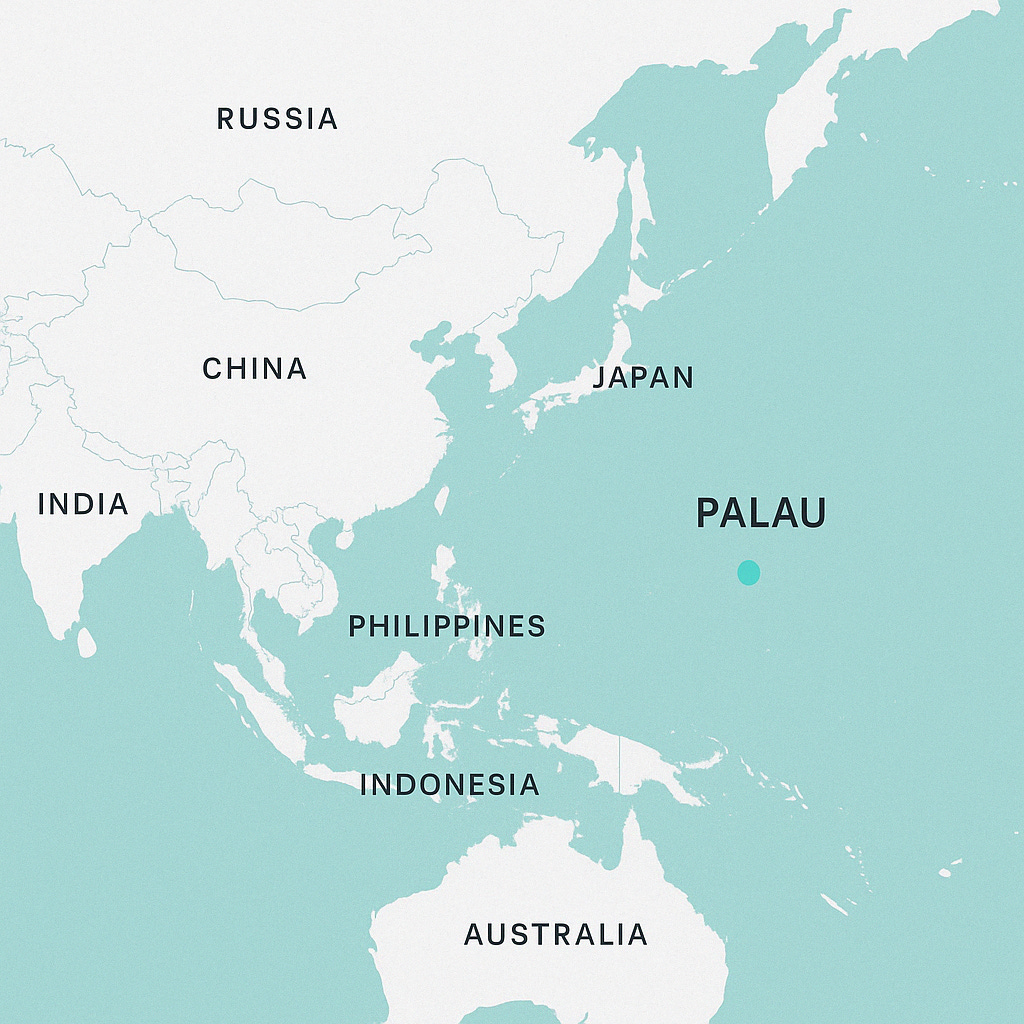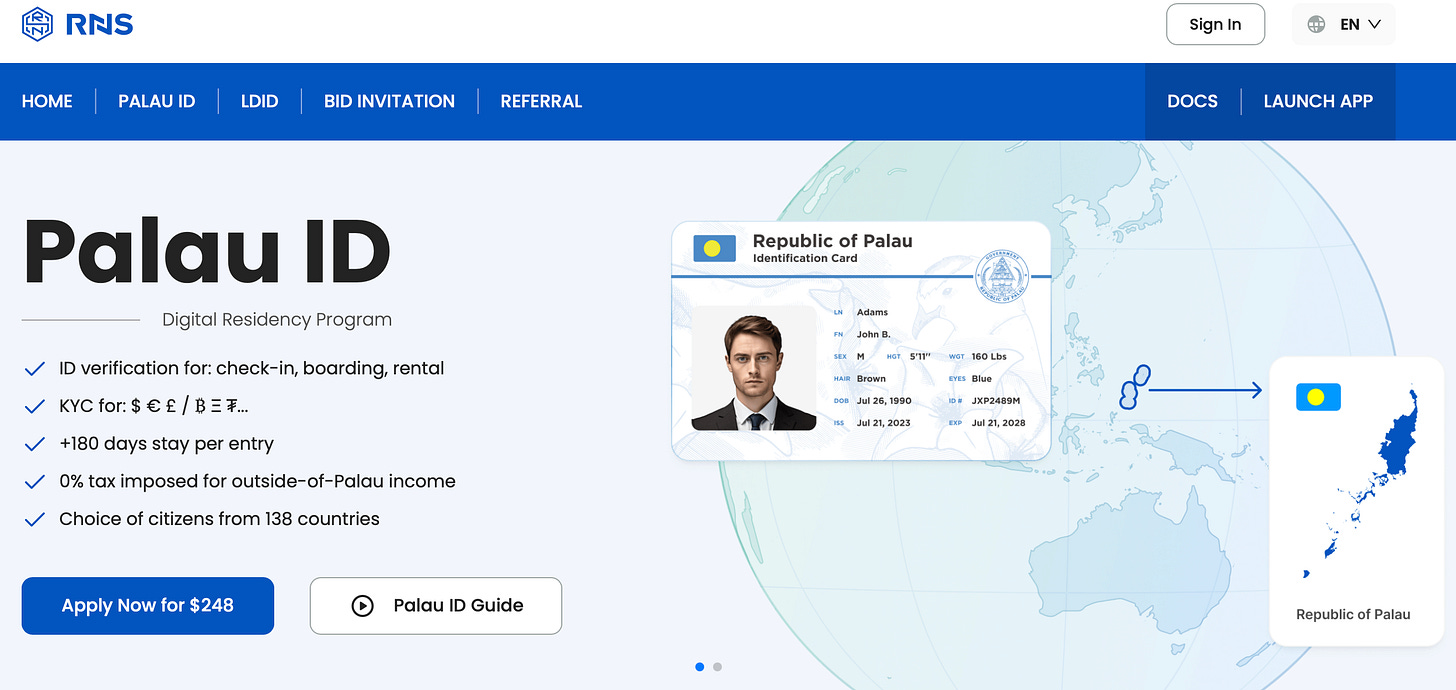Welcome to Digital Citizen 👋
After building businesses across multiple countries, one thing became clear:
Success isn’t tied to one system, one location, or one way of thinking.
In today’s world, you can design life on your terms—globally, intelligently, and with intention.
Digital Citizen is your guide to living smarter, working freely, and navigating a borderless world with clarity.
Subscribe to join a growing community of independent minds building a future without permission.
The Country Nobody Knows
You’ve probably heard of Estonia’s e-residency. Maybe even Lithuania’s.
But have you ever heard of Palau?
Most haven’t. That’s exactly what makes it interesting.
Where The Hell is Palau?
Palau is a remote island nation in the Pacific, home to about 18,000 people and some of the clearest waters on the planet.
In 2022, it launched something unexpected: an E-Residency program designed for the global digital generation.
And it’s not just a copy of what Estonia did. Palau’s approach is more private, decentralised, and—yes—Web3-friendly.
What Is An E-Residency?
E-Residency is a digital status offered by a government that lets you become a virtual resident—without ever setting foot in the country (in some cases, you actually do, but mostly you don’t have to).
You don’t get a passport or citizenship, but you do get access to tools that matter when you live and work online.
At its core, e-residency is about identity + infrastructure:
A government-issued digital ID
Often includes KYC verification (used for crypto, banking, and global services)
In some cases, the ability to register and run a business remotely
Access to digital signatures, contracts, or legal services
An extra layer of location-independent legitimacy for global entrepreneurs
The concept was made famous by Estonia—but now other nations, like Palau, are entering the scene with their own spin.
What You Can Use Palau’s E-Residency For
Palau’s e-residency is less about running a business and more about unlocking verified digital identity in a borderless world.
Here are some (current and future) use-cases:
✅ KYC Verification
Use your Palauan ID to pass Know-Your-Customer checks on crypto exchanges, DeFi platforms, or fintech services without relying on your home country’s documents.🪪 Global Digital Identity
Get a government-backed identity card (both physical and digital) that works across borders—even if you're living a nomadic life.🌐 Decentralized Identity Access
Plug into Web3 ecosystems and blockchain-based services that support DID (decentralized identity) standards.✍️ Digital Signatures (Coming Soon)
Sign documents and contracts online with legal recognition from a sovereign government.🏢 Company Incorporation (Planned)
Future iterations of the program may allow you to register a business entity in Palau—fully online.🛡️ Privacy-First Online Presence
Separate your real-world passport from your online business and financial activities, adding a layer of privacy and autonomy.🚀 Backup Identity Layer
Useful if your primary citizenship comes with restrictions, unstable infrastructure, or limited access to global systems.
Who It’s Ideal For
Palau’s e-residency isn’t for everyone—but it’s a smart move if you’re building a digital-first, location-flexible life. It works best for people who need identity verification more than physical presence or tax benefits. Here’s who might actually get value from it:
🔐 Crypto entrepreneurs & Web3 builders
Use a sovereign-issued ID to verify on exchanges, token platforms, and DAO governance systems without exposing your passport details.🌍 Digital nomads & remote workers
Need a neutral ID to access services while living across multiple countries.🧾 Citizens of countries with limited global access
Gain entry to platforms and financial tools your home passport might not support.👤 Privacy-conscious individuals
Keep your real-world identity separate from your online activity—legally and transparently.🧪 Digital sovereignty geeks
Love experimenting with new ways to live and work outside the traditional nation-state model.
How to Apply
Applying for Palau’s e-residency is refreshingly simple—no embassy visits or mountains of paperwork.
Here’s how it works:
Go to the official site
Choose your plan: $248/year for standard e-residency
Upload your documents: Passport + selfie + proof of address
Pass KYC: Done through their digital ID partners (e.g. Cryptic Labs)
Get your ID: A physical card is shipped globally, plus you get access to your digital credentials
You’ll typically get approved within a few days. The process is smooth and built for global users, with support available if you run into issues.
💡 Pro tip: If you're involved in crypto or global finance, having a Palauan ID can make onboarding to some platforms way faster—and sometimes even possible in the first place.
How It Compares
There are a few countries offering e-residency or similar programs—but Palau’s version plays a very different game.
Here’s how it stacks up:
Estonia
Focus: Business incorporation in the EU
Strengths: Access to EU banking, solid infrastructure
Limitations: More paperwork, stricter regulation, not crypto-native
Palau
Focus: Digital identity + Web3 access
Strengths: Fast approval, blockchain integrations, privacy-first
Limitations: No passport, no tax residency, services still expanding
If you’re looking to run a Euro-based company, Estonia wins. But if you’re playing in the decentralised world—or just want a verified ID that doesn’t come with strings attached—Palau’s worth a look.
What It Can’t Do
Let’s set expectations straight. Palau’s e-residency is useful, but it’s not magic. Here’s what it doesn’t give you:
It won’t replace your passport
It doesn’t grant you tax residency, a visa, or the right to live in Palau
It’s not a bank account or a shortcut to financial services
It’s not a shield for tax avoidance or regulatory evasion
Some of the promised features (like business registration) are still in development
This is best used as a complement to your existing tools—not a complete solution.
Final Thoughts
The future of identity might not belong to big nations. In a world where more of our life happens online, the most interesting innovations in citizenship, privacy, and access are coming from the fringes. Palau’s e-residency isn’t perfect, but it’s a signal: small countries are stepping into the digital arena—and they’re building for people like us.
“Your country is no longer where you're from—it's where you're free.”
— Naval Ravikant
For digital citizens, that’s a good thing. Because in the end, the ability to choose how and where you identify might be the real passport to freedom.
If you’re enjoying Digital Citizen, tap ❤️ and 🔄 at the top to help more curious minds find their way here. It means a lot.





![Palau: Das unbekannte Südseeparadies - [GEO] Palau: Das unbekannte Südseeparadies - [GEO]](https://substackcdn.com/image/fetch/w_1456,c_limit,f_auto,q_auto:good,fl_progressive:steep/https%3A%2F%2Fsubstack-post-media.s3.amazonaws.com%2Fpublic%2Fimages%2Fd6e27e6a-32ad-429b-b2eb-f54f08487680_2048x1352.jpeg)

